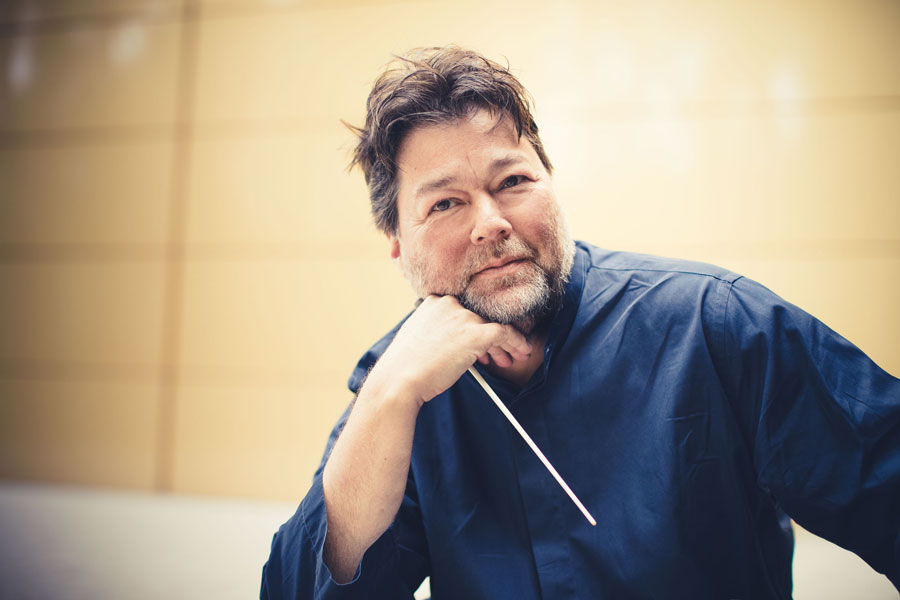Joseph Swensen was born in Hoboken, New Jersey and grew up in Harlem, New York City. He currently holds the post of Conductor Emeritus of the Scottish Chamber Orchestra, where he was Principal Conductor from 1996-2005. He is Principal Guest Conductor of the Orquesta Ciudad de Granada, in Spain, and Artistic Partner of the Northwest Sinfonietta, in the United States. He has served as Principal Guest Conductor and Artistic Adviser of the Orchestre de Chambre de Paris from 2009-2012 and has held positions at the Malmö Opera (2008-2011), Lahti Symphony, and the BBC National Orchestra of Wales. Swensen is the Starling Professor of Music, violin, at Indiana University, Jacobs School of Music. He has also been awarded an honorary doctorate from St. Andrew’s University, Scotland, and was invited to give a TEDx Talk with the title “Habitats for Music and the Sound of Math,” about music education and the developing brain, at the New York Institute of Technology. Joseph and Victoria Swensen are the founders of Habitat4Music, a non-profit organisation devoted to establishing participatory music education programs for children in underserved areas world-wide.
Claude Debussy was a child prodigy who entered the Paris Conservatoire at the age of ten to study composition with Guiraud, piano with Marmontel, and organ with Franck. Beau soir (Beautiful Evening) is one the most recognizable examples of Debussy’s early impressionist style. Debussy was only a teenager when he wrote the melody, in 1877, to a verse taken from a collection entitled Les aveux (Confessions) by Paul Bourget. The text depicts the poet's desire to be happy and enjoy life and the music paints the scene of an evening washed with sun and warm breeze. The phrasing is exceptionally lyric in the style of Jules Massenet and earlier French songs. Literature inspired many of Debussy’s compositions, “music and poetry are the only two arts that move in space,” he explained, and “musicians who do not understand poetry should not set it to music. They can only spoil it.”
The String Quartet in G Minor was the only string quartet Debussy composed during his lifetime. The work was completed in 1893, early in his career and shortly after L’Apres-midi d’un faune. The style is most often likened to the work of the Impressionist painters Manet, Monet, Degas, Renoir, and Pissarro, however, the composer preferred to be associated with the Symbolist poets Mallarmé, Verlaine, Rimbaud, and Maeterlinck. Debussy countered conventional music throughout his studies and developed a style of composition which used musical forms as aural light and color. "I am more and more convinced that music, by its very nature, is something that cannot be cast into a traditional and fixed form. It is made up of colors and rhythms. The rest is a lot of humbug invented by frigid imbeciles riding on the backs of the Masters – who, for the most part, wrote almost nothing but period music. Bach alone had an idea of the truth," the composer proclaimed.
Pyotr Ilyich Tchaikovsky began writing Souvenir d'un lieu cher (memories of a dear place) in Clarens Switzerland and finished it at the estate of Nadeja von Meck at Brailovo in Ukraine. The first movement Méditation was written in March 1878 and the other two movements were composed in May. There is no record of the first performance, but the piece was published in May of 1879. In a letter accompanying the manuscript, Tchaikovsky wrote, "In my opinion, the first of these is the best, but it gave me the most trouble; it is called Méditation and is to be played a tempo Andante. The second is a very brisk scherzo, and the third - Chant sans paroles. On giving these pieces to Marcel I experienced an indescribable melancholy, which stayed with me even as I sat down to write this; until I saw the lilacs still in full bloom, the grass still long, and the roses only just starting to blossom!" Originally written for violin and piano, an arrangement of the work was created for violin and orchestra by Alexander Glazunov, which was published in 1896 and is the best known. The composition is characteristic of Tchaikovsky's style employing beautiful melodies with Russian folk influence and a variety of contrasting sections.
Tchaikovsky noted that his Serenade for Strings was written "from inner conviction,” as a homage to his idol, Mozart. The Serenade reflects on the music that had been perfected by Mozart during his early Salzburg years, namely, the multi-movement, melody-rich genre that was often used to celebrate special occasions like weddings and graduation ceremonies. The work was completed in 1880 and was first performed at a private concert by Moscow Conservatory students on December 3rd. The public premiere took place in St Petersburg on October 30, 1881. The Serenade was an immediate success and remained one of Tchaikovsky’s favourites. In the modern repertoire, it is beloved as one of the most popular Romantic scores for string orchestra. Tchaikovsky wrote of the composition to his patron Nadeja von Meck, “You can be assured, dear friend, that my muse has been benevolent lately, when I tell you that I have written two long works very rapidly: a festival overture for the upcoming Exhibition and a serenade in four movements for string orchestra. The overture (the 1812 Overture) will be very noisy. I wrote it without much warmth and enthusiasm—therefore it has no great artistic value. The serenade, on the other hand, came from an inward impulse. I felt it, and I venture to hope that this work is not wholly lacking in artistic qualities.”
Alixandra Porembski, English Language Annotator

